| Srl | Item |
| 1 |
ID:
086575
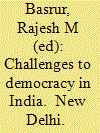

|
|
|
|
|
| Publication |
New Delhi, Oxford University Press, 2009.
|
| Description |
299p.
|
| Standard Number |
9780195698534
|
|
|
|
|
|
|
|
|
|
|
|
Copies: C:1/I:0,R:0,Q:0
Circulation
| Accession# | Call# | Current Location | Status | Policy | Location |
| 054139 | 320.0954/BAS 054139 | Main | On Shelf | General | |
|
|
|
|
| 2 |
ID:
074265
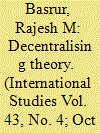

|
|
|
| 3 |
ID:
113255


|
|
|
|
|
| Publication |
2010.
|
| Summary/Abstract |
The end of the Cold War coincided with a significant change in India's relationship with the rest of the world. The somnolent elephant awoke to energize itself by liberalizing its economy and quickly emerged as a potential major power in global politics. From the standpoint of its neighbours in South Asia, there might well be cause for anxiety. India has long been viewed as a hegemonic power in the region. Do the strengthening sinews of the regional 'hegemon' bode ill for them? The article argues that India was a limited hegemon in the past, but that, in the contemporary era, while its economic and military power are growing significantly, it is actually becoming less hegemonic in its orientation towards its neighbours. In contrast with its strategic behaviour in the 1980s, it has now adopted a less interventionist relationship with its neighbours and its strategic gaze is focused beyond South Asia to the global setting as it pursues the status of a world power.
|
|
|
|
|
|
|
|
|
|
|
|
|
|
|
|
| 4 |
ID:
046531
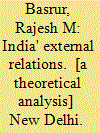

|
|
|
|
|
| Publication |
New Delhi, Commonwealth, 2000.
|
| Description |
v,225p.
|
| Standard Number |
8171696503
|
|
|
|
|
|
|
|
|
|
|
|
Copies: C:1/I:0,R:0,Q:0
Circulation
| Accession# | Call# | Current Location | Status | Policy | Location |
| 045440 | 327.54/BAS 045440 | Main | On Shelf | General | |
|
|
|
|
| 5 |
ID:
065573


|
|
|
| 6 |
ID:
055300
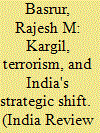

|
|
|
|
|
| Publication |
2002.
|
| Summary/Abstract |
In response to Pakistan's covert intervention in Kashmir, India sought to shed its perceived strategic paralysis by a strategy of compellence. While September 11 created a favorable international environment for military action against terrorists and their sponsors, accelerating terrorist attacks propelled Indian policymakers toward a military response. India gave effect to a newly developed concept of limited war by means of a military build-up designed to compel Pakistan both directly and indirectly (through the United States) to reverse its commitment to intervention in Kashmir. Such a strategy is flawed: concessions extracted can be withdrawn at any time, and brinkmanship risks loss of control and the outbreak of war between nuclear weapon states, with potentially horrific results.
|
|
|
|
|
|
|
|
|
|
|
|
|
|
|
|
| 7 |
ID:
072010


|
|
|
| 8 |
ID:
067086
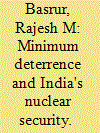

|
|
|
|
|
| Publication |
Stanford, Stanford University Press, 2006.
|
| Description |
245p.
|
| Series |
Studies in Asian security
|
| Standard Number |
0804752567
|
|
|
|
|
|
|
|
|
|
|
|
Copies: C:1/I:0,R:0,Q:0
Circulation
| Accession# | Call# | Current Location | Status | Policy | Location |
| 050449 | 355.02170954/BAS 050449 | Main | On Shelf | General | |
|
|
|
|
| 9 |
ID:
066670
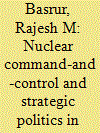

|
|
|
| 10 |
ID:
056243


|
|
|
| 11 |
ID:
019049


|
|
|
|
|
| Publication |
2001.
|
| Description |
181-198
|
|
|
|
|
|
|
|
|
|
|
|
|
|
|
|
| 12 |
ID:
088503
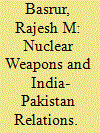

|
|
|
|
|
| Publication |
2009.
|
| Summary/Abstract |
India-Pakistan relations are best understood as an example of nuclear rivalry, in which nuclear weapons both exacerbate and limit hostility. In all such relationships, the minimal possession of nuclear weapons suffices to deter. Both India and Pakistan have adopted a minimalist posture, yet their strategic thinking tends to be inconsistent, which makes them vulnerable to needless expansion. This essay points to the conceptual basis for an optimal doctrine. It concludes that, while the military equation between India and Pakistan is stable, India has begun to widen the political gap between them.
|
|
|
|
|
|
|
|
|
|
|
|
|
|
|
|
| 13 |
ID:
088505


|
|
|
| 14 |
ID:
095254
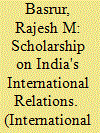

|
|
|
|
|
| Publication |
2009.
|
| Summary/Abstract |
An assessment of scholarship on India's International Relations (IIR) shows some significant weaknesses. At the global level, the discipline has not kept pace with rising interest in India. There is an appreciable degree of theoretical content in IIR, but it is relatively narrow in range. At the Asian level, interest in IIR is weak and, with exceptions, lacks engagement with theory as well as breadth of scope. In India, the discipline exhibits a wider spread but low-level theoretical content and relative isolation. Taken as a whole, the field needs greater creativity, theoretical depth and breadth of scope. The article concludes with a brief assessment of the reasons for these shortcomings and identifies the pathway to develop IR in India as a more vibrant discipline
|
|
|
|
|
|
|
|
|
|
|
|
|
|
|
|
| 15 |
ID:
083341
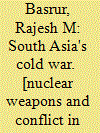

|
|
|
|
|
| Publication |
London, Routledge, 2008.
|
| Description |
xi, 171p.
|
| Series |
Asian security studies
|
| Standard Number |
9780415391948
|
|
|
|
|
|
|
|
|
|
|
|
Copies: C:1/I:0,R:0,Q:0
Circulation
| Accession# | Call# | Current Location | Status | Policy | Location |
| 053852 | 355.02170954/BAS 053852 | Main | On Shelf | General | |
|
|
|
|
| 16 |
ID:
008512
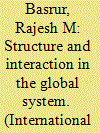

|
|
|
|
|
| Publication |
1994.
|
| Description |
377-397
|
|
|
|
|
|
|
|
|
|
|
|
|
|
|
|
| 17 |
ID:
087543
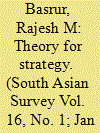

|
|
|
|
|
| Publication |
2009.
|
| Summary/Abstract |
The realist school of thought in international relations theory, under attack in the post-Cold War era for its numerous failings, has turned away from its focus on system structure to a refined version of its earlier form, which also focused on domestic factors and policy choice. But the neoclassical school neglects important systemic dynamics arising from variations in levels of economic and strategic interdependence. A refined neoclassical approach, by focusing on the relationship between degrees of interdependence and the role of structure, identifies the scope for optimal policy choice in different settings. For India, a nation on the threshold of major power status, this provides an improved basis for interpreting the changing international system and fashioning an appropriate broad strategy toward it.
|
|
|
|
|
|
|
|
|
|
|
|
|
|
|
|
| 18 |
ID:
101076
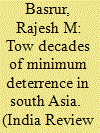

|
|
|
|
|
| Publication |
2010.
|
| Summary/Abstract |
review of two decades of the India-Pakistan nuclear relationship shows that, like all nuclear rivalries, deterrence works at a minimal level regardless of beliefs about the requirements of deterrence. Also, like other nuclear rivalries, it displays a fundamentally schizophrenic behaviour pattern. When conflict draws close, India and Pakistan completely reject the usability of nuclear weapons and ignore the tenets of deterrence theory and doctrine; but when conflict is distant, they tend to behave as if the weapons are usable, which influences their doctrines and weapons acquisitions. The India-Pakistan case reveals a relatively cost-effective and risk-resistant minimalism, but is distorted by powerful elements of thinking-typified by the writings of Albert Wohlstetter-that has produced an arms race and a significant element of instability into the relationship
|
|
|
|
|
|
|
|
|
|
|
|
|
|
|
|